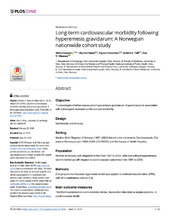| dc.contributor.author | Fossum, Stine | en_US |
| dc.contributor.author | Næss, Øyvind | en_US |
| dc.contributor.author | Halvorsen, Sigrun | en_US |
| dc.contributor.author | Tell, Grethe S. | en_US |
| dc.contributor.author | Vikanes, Åse | en_US |
| dc.date.accessioned | 2020-01-07T10:45:27Z | |
| dc.date.available | 2020-01-07T10:45:27Z | |
| dc.date.issued | 2019-06-12 | |
| dc.Published | Fossum S, Næss Ø, Halvorsen S, Tell GST, Vikanes Å. Long-term cardiovascular morbidity following hyperemesis gravidarum: A Norwegian nationwide cohort study. PLOS ONE. 2019;14(6):e0218051. | eng |
| dc.identifier.issn | 1932-6203 | |
| dc.identifier.uri | https://hdl.handle.net/1956/21261 | |
| dc.description.abstract | Objective: To investigate whether exposure to hyperemesis gravidarum (hyperemesis) is associated with subsequent maternal cardiovascular morbidity. Design: Nationwide cohort study. Setting: Medical Birth Registry of Norway (1967–2002) linked to the nationwide Cardiovascular Disease in Norway project 1994–2009 (CVDNOR) and the Cause of Death Registry. Population: Women in Norway with singleton births from 1967 to 2002, with and without hyperemesis, were followed up with respect to cardiovascular outcomes from 1994 to 2009. Methods: Cox proportional hazards regression model was applied to estimate hazard ratios (HRs) with 95% confidence interval (CI). Main outcome measures The first hospitalisation due to nonfatal stroke, myocardial infarction or angina pectoris, or cardiovascular death. Results: Among 989 473 women with singleton births, 13 212 (1.3%) suffered from hyperemesis. During follow-up, a total of 43 482 (4.4%) women experienced a cardiovascular event. No association was found between hyperemesis and the risk of a fatal or nonfatal cardiovascular event (adjusted HR 1.08; 95% CI 0.99–1.18). Women with hyperemesis had higher risk of hospitalisation due to angina pectoris (adjusted HR 1.28; 95% CI 1.15–1.44). The risk of cardiovascular death was lower among hyperemetic women in age-adjusted analysis (HR 0.73; 95% CI 0.59–0.91), but the association was no longer significant when adjusting for possible confounders. Conclusion: Women with a history of hyperemesis did not have increased risk of a cardiovascular event (nonfatal myocardial infarction or stroke, angina pectoris or cardiovascular death) compared to women without. | en_US |
| dc.language.iso | eng | eng |
| dc.publisher | Public Library of Science | eng |
| dc.rights | Attribution CC BY 4.0 | eng |
| dc.rights.uri | http://creativecommons.org/licenses/by/4.0/ | eng |
| dc.subject | Cardiovascular diseases | eng |
| dc.subject | Hypertensive disorders in pregnancy | eng |
| dc.subject | Angina | eng |
| dc.subject | Myocardial infarction | eng |
| dc.subject | Norway | eng |
| dc.subject | Diabetes mellitus | eng |
| dc.subject | Pregnancy | eng |
| dc.subject | Norwegian people | eng |
| dc.title | Long-term cardiovascular morbidity following hyperemesis gravidarum: A Norwegian nationwide cohort study | en_US |
| dc.type | Peer reviewed | |
| dc.type | Journal article | |
| dc.date.updated | 2019-09-18T14:20:16Z | |
| dc.description.version | publishedVersion | en_US |
| dc.rights.holder | Copyright 2019 The Author(s) | |
| dc.identifier.doi | https://doi.org/10.1371/journal.pone.0218051 | |
| dc.identifier.cristin | 1713884 | |
| dc.source.journal | PLoS ONE | |

